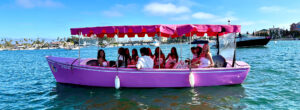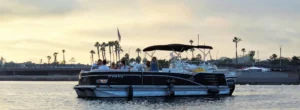Introduction
Nighttime boating offers a unique and serene experience, allowing you to enjoy the water under the stars, away from the daytime crowds. Whether you’re planning a sunset cruise or an evening fishing trip, boating at night can be both magical and peaceful. However, nighttime boating comes with its own set of challenges and safety considerations. To ensure a smooth and enjoyable experience, it’s essential to be well-prepared and understand the specific requirements for navigating after dark. This guide will walk you through the key aspects of nighttime boating, from safety tips to necessary equipment.
With proper planning and the right knowledge, you can enjoy the beauty and tranquility of the water at night without compromising on safety. From the importance of lighting and navigation to the best practices for avoiding hazards, this article covers everything you need to know to make your nighttime boating adventure both safe and memorable.
Whether you’re a seasoned boater or new to the water, following these guidelines will help you navigate the waters after dark and fully enjoy the peacefulness and beauty that nighttime boating has to offer.
Proper Lighting and Navigation
One of the most critical elements of nighttime boating is ensuring that your boat is equipped with the proper lighting. Navigation lights are not only essential for your visibility, but they also signal your boat’s position to others on the water. It’s important to check that your boat’s bow (red and green) and stern (white) navigation lights are working properly before setting out for the night.
Additionally, it’s helpful to have extra portable lights on board, such as flashlights and headlamps. These can be useful when you need to check maps, navigate around the boat, or illuminate specific areas. Make sure your lights are charged or have extra batteries available to avoid being left in the dark at a crucial moment.
In addition to lights, having up-to-date navigation charts or GPS is vital for nighttime boating. With reduced visibility, it can be more difficult to spot landmarks or markers. A reliable GPS system or well-marked charts can help guide you safely through unfamiliar waters and ensure you stay on course.
Know the Local Boating Laws
Each area has its own set of boating regulations, and it’s important to familiarize yourself with the rules for nighttime boating in your location. This includes speed limits, no-wake zones, and specific lighting requirements. Some areas may have curfews or restrictions on boating after dark, so it’s essential to check local regulations before heading out.
Additionally, certain waterways may have specific guidelines regarding navigation markers, and these can be more difficult to spot at night. Ensure you know how to identify buoys and other markers in low-light conditions to avoid running aground or colliding with obstacles.
Being aware of local laws and regulations not only keeps you safe but also helps avoid fines or penalties that can result from violating nighttime boating rules. By following the proper guidelines, you’ll ensure a smoother and more enjoyable boating experience for yourself and others.
Importance of a Float Plan
A float plan is a critical safety measure for nighttime boating, especially if you’re venturing out alone or into unfamiliar waters. A float plan involves notifying someone onshore about your boating plans, including your route, destination, and estimated return time. This way, in case of an emergency, someone will know where to start looking if you don’t return as scheduled.
When creating a float plan, include details such as the names of those on board, the make and model of your boat, your starting point, and your intended route. Make sure to update your contact person if you decide to change your course or extend your trip, and always inform them once you’ve safely returned to shore.
In the event of an emergency, having a float plan can be crucial for rescue efforts. It provides authorities with important information about your whereabouts and can significantly reduce response time in locating you. A well-prepared float plan gives both you and your loved ones peace of mind while you’re out on the water at night.
Reduce Speed and Stay Vigilant
Reduced visibility is one of the main challenges of nighttime boating, and it’s essential to adjust your speed accordingly. Even if you’re familiar with the waterway, hazards such as debris, other vessels, or shallow areas may be more difficult to spot in the dark. By slowing down, you’ll have more time to react and avoid potential obstacles.
It’s also important to remain vigilant and maintain a proper lookout. Assign someone on board to help keep an eye out for hazards or other boats, and stay aware of your surroundings at all times. Keep in mind that the light from other boats can be deceiving at night, making it harder to judge distances accurately.
By reducing speed and staying alert, you’ll minimize the risk of accidents and create a safer boating experience for everyone on board. Nighttime boating requires extra caution, so always prioritize safety over speed and take your time navigating the water.
Communication Devices and Safety Equipment
In case of an emergency, having reliable communication devices on board is essential. A marine VHF radio is one of the most important tools for nighttime boating, as it allows you to communicate with other boaters or emergency services even when cell phone signals are weak or unavailable. Make sure your VHF radio is in good working condition before heading out.
In addition to a VHF radio, bring a fully charged mobile phone in a waterproof case as a backup communication tool. Emergency signaling devices such as flares, whistles, and a flashlight are also important to have on hand in case you need to attract attention at night.
Ensure that your boat is equipped with standard safety equipment, including life jackets, a first aid kit, and fire extinguishers. Regularly check that all safety gear is in good condition and easily accessible in case of an emergency. Being well-prepared with the right communication devices and safety equipment can make all the difference in an unexpected situation.
Dress Appropriately for Nighttime Conditions
Even in warmer climates, temperatures can drop significantly after sunset, especially on the water. It’s important to dress in layers and bring warm clothing to stay comfortable throughout the night. Windbreakers, sweaters, and blankets are good options to have on board in case the temperature drops.
In addition to staying warm, it’s also important to dress in a way that enhances your visibility. Consider wearing reflective or brightly colored clothing, especially if you’ll be moving around the boat frequently. This helps ensure that you and your passengers are visible to other boaters and each other, reducing the risk of accidents.
By dressing appropriately and bringing extra layers, you’ll stay comfortable and safe during your nighttime boating adventure. Proper clothing and gear make a big difference when it comes to enjoying your time on the water after dark.
Avoid Alcohol and Stay Sober
While it may be tempting to enjoy a drink while boating, it’s especially important to stay sober when operating a boat at night. Nighttime boating requires heightened awareness, focus, and quick reflexes, all of which can be impaired by alcohol. Boating under the influence not only puts you and your passengers at risk but is also illegal and can result in serious consequences.
Designate a sober operator for the boat, and encourage everyone on board to drink responsibly. It’s important to stay hydrated and focused, especially when navigating the challenges of nighttime boating. There are plenty of non-alcoholic beverages that can be just as enjoyable on a night cruise.
By staying sober, you’ll ensure that you’re fully alert and able to handle any unexpected situations that may arise. Nighttime boating is more enjoyable when you can confidently and safely navigate the water without the added risks of alcohol impairment.
Respect Wildlife and Other Boaters
At night, many animals are more active, and the water is often quieter. It’s important to respect the local wildlife and other boaters by keeping noise levels to a minimum and avoiding bright, disruptive lights that may disturb the environment. Be mindful of your surroundings and avoid speeding or making sharp turns that could impact the wildlife or nearby vessels.
If you encounter other boats on the water, be sure to follow proper etiquette, such as reducing your speed when passing and using your lights appropriately to signal your presence. Avoid shining bright lights directly at other boats, as this can impair their vision and create unsafe conditions.
By respecting wildlife and fellow boaters, you’ll contribute to a safer and more enjoyable environment for everyone on the water. A peaceful night on the water is best enjoyed when all boaters practice courtesy and consideration.
Be Prepared for the Unexpected
While nighttime boating can be a serene experience, it’s important to be prepared for any unexpected situations that may arise. This includes keeping an eye on the weather forecast before heading out and being prepared to return to shore if conditions change. Sudden shifts in weather can make nighttime boating more challenging, so always err on the side of caution.
Additionally, ensure that your boat is in good working order before embarking on a night cruise. Check the engine, fuel levels, and all equipment to prevent mechanical issues that could leave you stranded on the water. Having extra fuel and essential tools on board can help you manage minor problems if they arise.
Being prepared for the unexpected helps you stay in control and avoid stressful situations. By planning ahead and taking precautions, you’ll be able to enjoy your nighttime boating adventure with peace of mind.
Conclusion
Nighttime boating offers a unique opportunity to experience the water in a peaceful and magical way, but it also requires extra care and preparation. From ensuring proper lighting and following local regulations to maintaining safety and communication, these precautions are essential for a smooth and enjoyable experience after dark.
By following the tips outlined in this guide, you can navigate the challenges of nighttime boating with confidence and create lasting memories under the stars. Whether you’re cruising along a calm lake, exploring coastal waters, or enjoying a quiet evening on a river, nighttime boating is an experience like no other—just remember to prioritize safety and stay prepared for any situation.
So, gather your gear, plan your route, and get ready for an unforgettable night on the water. With the right preparation and mindset, nighttime boating can be both safe and incredibly rewarding.
Excited for an adventure with us or have a question? Call us at: (949) 675-8433 Book Your Ride with us: Click here to Book


